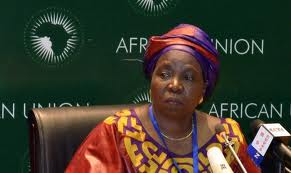AU vows new support for durable peace between the two Sudans
By Tesfa-Alem Tekle
January 6, 2013 (ADDIS ABABA) – The African Union (AU) on Sunday freshly committed itself to end differences and bring a just and lasting peace between former civil war rivals Sudan and South Sudan.

In a statement issued on Sunday, Diamini-Zuma, assured of the continental body’s commitment to put better coordinated efforts to realise a situation where the two nation’s coexist side by side peacefully.
The AU chief underscored the importance of the progress gained during the presidential summit held in the Ethiopian capital on January 4 and 5 with respect to Abyei, border issues and the implementation of agreements signed last September.
The two presidents agreed to implement the existing agreement, but a separate future summit will be held over Abyei. On January 13, the African Union High-Level Implementation Panel (AUHIP) led by Thabo Mbeki will lay out the time-frames in which the deal of three months ago would be implemented.
The September deal stalled due to Khartoum’s insistence that resolving security issues preclude implementing any other part of the nine-point deal. Sudan accuses South Sudan of backing rebels in its South Kordofan and Blue Nile states, while Juba accuses Khartoum of backing rebels in its territory. Both sides deny the allegations.
It was reported that Kiir told Bashir that his armed forces are not supporting their former comrades north of the border, but such assurances have in the past not been enough for Khartoum. Kiir has described Sudan’s demands that South Sudan’s army (SPLA) play a role in disarming the SPLA-North as “impossible”.
However, Diamini-Zuma expressed hope that the leaders of Sudan and South Sudan would continue to demonstrate the statesmanship and political courage to find robust solutions to the challenges that remain dividing the two neighbours.
Landlocked South Sudan became independent state in July 2011 taking with it 75% of Sudan’s oil resources. A year ago, South Sudan stopped oil production over a transit fee dispute with Khartoum and despite agreeing on how much South Sudan should pay to export it oil through the north in the September deal, production has not resumed due to the stalemate over security issues.
The two countries badly need the resumption of Southern oil exports to revive their struggling economies. Presidents Bashir and Kiir recommitted to the setting up a demilitarized border zone and resolving other security issues to allow oil exports to resume.
Dlamini Zuma called on both leaders to cooperate and work together to establish friendship and good neighborliness to bring prosperity to benefit the peoples of the two nations.
(ST)
